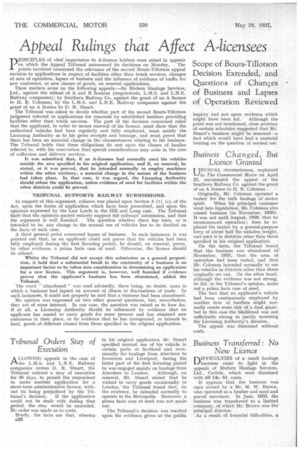Appeal Rulings that Aff ect A-licensees
Page 40

If you've noticed an error in this article please click here to report it so we can fix it.
Scope of Bouts-Tillotson Decision Extended, and Questions of Changes of Business and Lapses of Operation Reviewed
PRINCIPLES of vital importance to A-licence holders were raised in appeals on which the Appeal Tribunal announced its decisions on Monday. The points involved concerned the relevance of the second Bouts-Tillotson appeal decision to applications in respect of facilities other than trunk services, changes of area of operation, lapses of business and the influence of evidence of traffic for new customers, or new classes of goods, on renewal applications.
These matters arose on the following appeals:—By Modern Haulage Services, Ltd., against the refusal of A and B licences (respondents, L.M,S. and L.N.E. Railway companies); by Southern Railway Co. against the grant of an A licence to H. R. Coleman; by the L.M.S. and L.N.E. Railway companies against the grant of an A licence to D. R. Stuart.
The Tribunal was asked to decide whether part of the second Bouts-Tillotson judgment referred to applications for renewals by established hauliers providing facilities other than trunk services. The part of the decision concerned ruled that the applicant, in order to secure renewal of his licence, must show that the authorized vehicles bad been regularly and fully employed, must satisfy the Licensing Authority as to his gross receipts and tonnage, and must prove that there has been no material change in the circumstances relating to his business. The Tribunal holds that these obligations do rest upon the classes of haulier referred to, with the reservation that special considerations may arise in the case of collection and delivery services.
It was submitted that, if an A-licensee had normally used his vehicles outside the area specified in his original application, and if, on renewal, he stated, or it was proved, that he intended normally to employ machines within the other territory, a material change in the nature of the business had taken place. In that case, it was argued, the Licensing Authority should refuse the application, unless evidence of need for facilities within the other districts could be proved.
' TRIBUNAL SUPPORTS RAILWAY SUBMISSIONS.
In support of this argument, reliance was placed upon Section 5 (1) (c) of the Act, upon the forms of application which have been prescribed, and upon the opinions expressed by the Law Lords in the Hill and Long case. The Tribunal finds that the opinions quoted entirely support the railways' submission, and that the argument is well founded. The question whether there has been, or is intended to be, any change in the normal use of vehicles has to be decided on the facts of each case.
A third general point concerned lapses of business. In such instances, it was pointed out that, as an applicant could not prove that his vehicles had been fully employed during the first licensing period, he should, on renewal, prove, by other evidence, a prima facie case of need. Otherwise, the licence should be refused.
Whilst the Tribunal did not accept this submission as a general proposition, it held that a substantial break in the continuity of a business is an important factor to be taken into consideration in determining an application for a new licence. This argument is, however, well founded if evidence proves that the applicant's business has been abandoned, added the Tribunal.
The word " abandoned " was used advisedly, there being, no doubt, cases in which a business had lapsed on account of illness or fluctuations of trade. In such instances, it could not properly be said that a business had been abandoned.
No opinion was expressed on two other general questions, but, nevertheless, they are of some interest. In one case, the question was raised as to how far, if at all, a Licensing Authority should be influenced by evidence that an applicant has ceased to carry goods for some persons and has obtained new customers in their place, or by evidence that he has transported, or intends to haul, goods of different classes from those specified in the original application.




























































































